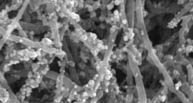It's a Nano World (Page 4)
Nano is Big with Students

A magnification of carbon nanotubes from an electron microscope.
Nanotechnology's diverse potential is attracting students from engineering, science and life sciences to McGill's senior undergraduate class in nano research, the only one of its kind in Canada. As befits the topic's multidisciplinary nature, the course is team-taught by Lennox, Grütter and other nano experts from science and engineering. While the course introduces some of nanotechnology's basic principles, it has an additional objective, which Lennox stresses in the opening class: to educate students to sift through the hype, propaganda and hysteria that occasionally risk overwhelming the field.
Mass misunderstanding of nanotechnology is a serious threat to research, says Grütter. Often, scientists themselves are to blame. "If you shout loud enough that you'll change the way the world will work, eventually people will start to believe you. And then you have little control over expectations." One result is that a number of debates have erupted around nano research, and while some concerns are serious, others are ludicrous. "A lot of discussions about ethics and nanotechnology have focused on things which are not even scientifically possible," he says.
The strongest case in point is the "grey goo" anxiety. Eric Drexler, of the Foresight Institute - "which is more cult than science," says Grütter - hypothesized in his 1986 book Engines of Creation that self-replicating nano-robots could assemble items - a footstool, for example, or maybe a sandwich - atom by atom, presumably like a Star Trek replicator vending machine. "The idea was total baloney," says Grütter, "and contradicts lots of known laws of physics and chemistry."
Drexler also hypothesized that these nano-robots could get out of control, replicating continually and forming an ever-increasing "grey goo" that could absorb other materials. "No one has ever explained how any of this might be possible," says Lennox. But the idea has proven media-friendly, despite - or perhaps because of - its echoes of medieval alchemy, and its "Blob That Eats the World" script has since created anxiety among the credulous.
Don't Believe the Hype
Apocalyptic science fiction is not the only threat to nano research. So is unsubstantiated hype, occasionally from scientists or organizations pumping for research dollars or good PR. "Statements like 'Nano is going to make health care unrecognizable in ten years' are garbage," Grütter stresses. As Marc McKee's research demonstrates, nano components are likely to appear in health care applications, but their presence will probably be quite subtle. "Society, and politicians in particular, develop expectations, and a few years down the road may not be willing to wait for us to deliver on them," says Grutter. "And so we lose credibility."
In exchange for the hype, Grütter offers a sober counter-prediction: "Nanotechnology will not necessarily stimulate a huge technological revolution, the way silicon has, although it may influence aspects of everyday life 30 years from now. Instead, it will probably be incorporated into other industries." So aluminum alloys will be stronger, medical implants will be accepted more readily, and computers will be smaller and faster. And, of course, coatings for textiles, such as the Bay's nano-pants, are likely applications. Cosmetics giant L'Oréal is already the third biggest patent-holder in the world of nano, applying the technology in creating such products as hypoallergenic makeup and long-lasting sunscreen.
"Nano materials are already out there," Grütter says. But the future looks less like the science fiction scenarios painted by the over-enthused and the anxious. Nano materials are likely to seem fairly mundane, once we get to know them. And we may be wearing them already.


